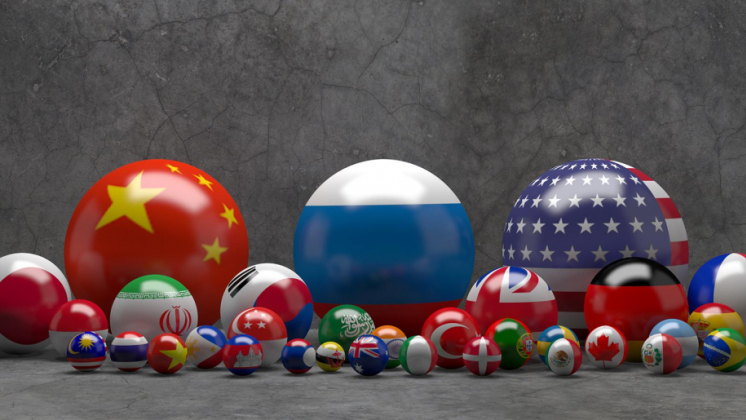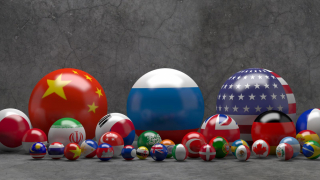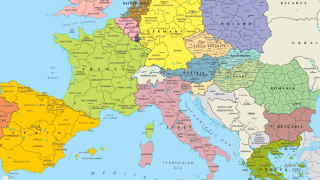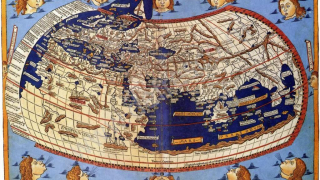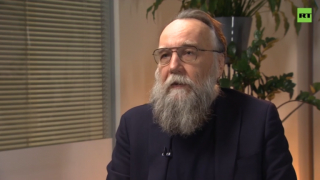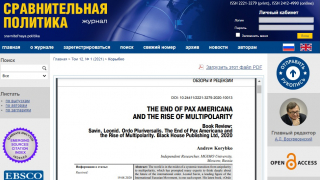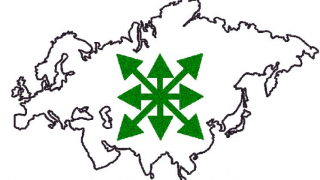Power and Occasion: Metaphysics of Metapolitics
Anyone who invokes terms such as civilisation or progress must clarify their meaning and justify their use, for the pervasive evolutionary mindset of modern society—bound in a Faustian pact with Perpetual Progress—has eclipsed human character in the name of civilisation. The concept itself, forged during the Enlightenment, became inseparable from ideals of progress and modernisation, soon deemed self-evident and beyond questioning.
Today, few dispute the dominance of this paradigm, grounded in an implicit orientation toward German Idealism and opposed to the substantive metaphysics of metapolitics. Among the leading dissidents is the philosopher Alexandr Dugin. In his seminal work, The Fourth Political Theory (2012), he posits that progress and modernisation are not absolute universals but relative concepts, contingent upon specific historical, social, and political circumstances. Dugin posits an alternate typology of political history anchored in figurative occasionalism. Here, societal transformations do not emerge from a continuous evolutionary trajectory but are driven by discrete semantic occasions—events loaded with historical and political significance that catalyse change.
These occasions, he implies, are not the outcomes of deterministic processes but rather concrete interventions that redefine sociopolitical systems. This occasionalist archetype is grounded in a purposeful ambiguity at the nexus of theology and politics: the divine alone acts as the efficient cause of all events, while created beings serve only as occasions for divine will to unfold.
To transcend mere metaphor, occasionalist metapolitics must conceive the political agent—whether leader or civilisation—not as autonomous efficient cause but as 'significant conduit'. Here, the 'semantic occasion' is no human-willed event but an availability or rupture in the Real, irrupting from the transcendent.
The sovereign assumes not the demiurge's role of fabricating change but that of decisive interpreter, whose praxis discerns and actualises this metaphysical possibility within the historical order. Politics thus becomes a hermeneutics of the sacred: human agency provides the occasion for divine causality—or the truth of Being—to manifest as concrete Nomos, inaugurating novel meaning whilst preserving the principle of transcendent ultimate causation. Multipolarity follows logically from the multiplicity of such irreducible, creative receptions.
Challenging, in this way, Hegelian aseity of reason and the purported universality of natural law, it reveals how these concepts function as instruments for enforcing and legitimising a global moral monopoly, which Dugin counters with sighting a multipolar order, where civilisations embody distinct channels of divine disclosure, unyielding to assimilation under a unipolar framework.
Although Alexandr Dugin does not elaborate broadly on the occasionalist analogy, his reference to Carl Schmitt opens a fruitful intellectual terrain. Political scientist Leonid Savin likewise reclaims Schmitt's Nomos of the Earth to frame the current epoch as witnessing the birth of a Fourth Nomos beyond the unipolar order (Savin, 2021).
Pierre Bourdieu, in The Political Ontology of Martin Heidegger (1991), shows that Heidegger's philosophy cannot be disentangled from its political and cultural milieu, since his existential categories—fallenness, errancy, historicity—are secularised transpositions of theological-political dispositions forged in response to the crisis of modernity.
His critique of the technical civilisation and of the myth of progress is bound up with an ontologisation of the historical, replacing the notion of linear evolution with a temporality marked by ruptures and occasions, thereby prefiguring a metapolitics that exceeds idealistic frameworks of autonomous reason. In this light, Heidegger emerges as a thinker who, far from reinforcing faith in universal progress, subverts it, aligning with an occasionalist understanding of history.
Where Schmitt stressed the juridical ground of the political, Eurasian thought extends this into metaphysics, contrasting the Western Nomos of Law with an Earth of Grace rooted in divine disclosure. From this perspective, occasionalism and multipolarity converge as metapolitical principles that refuse to separate politics from theology.
Let us proceed to unpack the occasionalist dimensions of this metapolitical realm: occasionalism, as a metaphysical doctrine, traces its roots to the Stoic philosophers, who denied efficient causality to finite entities, ascribing all worldly actions exclusively to divine agency. In this schema, creatures serve just as occasions that trigger the operation of the true efficient cause.
This cause may manifest as a final cause, exerting an attractive force on efficiency, or as a secondary efficient cause, impelling the primary one, thereby conceptualising God as the Universal Consciousness or Logos. The doctrine was later revitalised by the medieval Iranian thinker Al-Ghazali, whose occasionalist framework asserts that all causes and effects are instantaneously created by God in each successive moment, with no intrinsic causal nexus between events; instead, divine intervention ensures their coherence on every occasion (Al-Ghazali, 2000).
Scholastic philosopher Francisco Suárez later tempered Al-Ghazali's radical position by allowing secondary causes a limited autonomy while preserving God as ultimate source. This grants a measure of autonomy to secondary causes, allowing them to operate according to their intrinsic natures while upholding God as the primary and ultimate cause (Suárez, 1597).
Suárez's refinements resonate with Heidegger's phenomenology, which, though not explicitly occasionalist, underscores the difficulties of relationality between beings. For Heidegger, the human ethos and praxis inevitably distort disclosure, just as Suárez allowed accidents to shape the individuality of substances. This yields a tension between appearance and essence, between the disclosed world and the inaccessible ground of being.
This tension finds a secular analogue in the philosophy of Graham Harman. Harman's object-oriented ontology asserts that real objects withdraw from direct contact; their relations occur only through sensual objects, mediated by what he calls 'vicarious causation' and moments of 'allure'. On this view, causal contact is never immediate but always refracted through intermediaries (Harman 2005).
In this sense Harman presents a secularised echo of occasionalism, yet with a decisive difference: where al-Ghazali placed divine agency as the sole efficient cause, Harman displaces causality into a network of autonomous objects. His model sustains the logic of mediation without recourse to theology, providing a useful counterpoint to the immediacy of theological occasionalism.
Placed beside Neoplatonism, the contrast sharpens. Occasionalism collapses causality into the direct act of God; Harman disperses it across plural objects; Neoplatonism situates it within a graded chain of emanations from the One. Each in turn rejects the sufficiency of mechanical naturalism, yet they diverge radically in how transcendence engages with the world. Where occasionalism insists upon vertical immediacy, and object-oriented ontology upon horizontal withdrawal, Neoplatonism elaborates a hierarchy of intermediaries, preserving both transcendence and participation.
Yet the philosophical schism between occasionalism and Neoplatonism elucidates fundamental divergences in metaphysical conceptualisations of causality and reality's architecture, particularly regarding the divine-world nexus. Both schools of thought reject the sufficiency of mundane natural causation for comprehending reality, yet they split profoundly in their portrayals of divine agency and mediation. Occasionalism, as expounded by Al-Ghazali and adapted within metapolitical theology, champions a radical vertical immediacy, upholding God as the sole efficient cause, entirely without mediation.
Conversely, Neoplatonism, as articulated by Plotinus, erects a vertical mediation edifice, envisaging a hierarchical cascade of emanations from the One, channelling divine influence in a stepwise descent. This contrast not only accentuates their disparate causal approaches but also underscores opposing cosmologies and anthropologies, enriching the discourse on occasionalism's theological and metapolitical ramifications and overlaps.
In occasionalism, the causal chain is radically truncated: God singularly enacts as efficient cause, rendering all phenomena direct emanations of divine volition. Rooted in Al-Ghazali's theology and extended in Dugin's metapolitical theology, this eliminates intermediary causes to exalt divine sovereignty. Dugin allegorically extrapolates this to politics, where civilisations emerge as singular occasions of divine revelation, unimpeded by universal rationalist schemas (Dugin, 2012). This immediacy embodies metaphysical thrift, shunning secondary causation to posit God as the unmediated font of reality.
While occasionalism collapses the causal chain into direct divine immediacy, Neoplatonism elaborates a mediated cosmos in which the divine permeates reality through successive layers of being. It envisions causality not as sudden divine intrusion but as a graduated unfolding through intermediaries.
Plotinus situates reality as emanating from the ineffable One, cascading through successive hypostases—the Intellect (Nous) and the Soul (Psyche)—that bridge absolute unity and the plurality of the material world. This continuum preserves the transcendence of the One while grounding the coherence of cosmic multiplicity.
Iamblichus deepens this vision by positing a spectrum of intermediary beings—angels, daimones, and heroes—who articulate the divine descent into the human realm. These mediators safeguard divine transcendence while enabling finite beings to participate in the cosmic order (Iamblichus, 2003).
Anthropologically, the divergence from occasionalism is decisive: whereas occasionalism emphasises human passivity before immanent divine causality, Neoplatonism grants humanity an active role in ascent and cooperation with the divine. Here causality flows progressively and participatorily, diverging from the unmediated directness of occasionalism.
In On the Mysteries, Iamblichus specifies the functions of these beings: angels as emissaries, daimones as cosmic regulators, heroes as communal exemplars. Their hierarchy forges a stratified order wherein each level partakes of its superior, ensuring divine causality diffuses through a participatory flux. The soul's noetic ascent hinges on engaging these mediators, achieving consonance with the divine.
Unlike occasionalism's repudiation of secondary causes, Neoplatonism affirms a cosmos where divine effluence refracts through intermediary strata, binding transcendence and immanence into a continuous, partaking metaphysics. Humans thus ascend through ritual, contemplation, and alignment with intercessors, never cut from the divine source.
Both traditions agree that mechanistic causation inadequately explains reality's intricacy, demanding a transcendent origin for order and meaning. Yet their strategies diverge sharply: occasionalism's immediacy pads causality into divine singularity, accentuating omnipotence at the expense of creaturely autonomy, while Neoplatonism's mediation extends causality through multiplicity, endorsing a harmonious cosmos of shared participation.
Politically, Dugin interprets occasionalism as underwriting multipolar civilisations, each a direct divine expression, whereas Neoplatonism intimates interconnected polities integrated within a cosmic hierarchy.
Far from an antiquarian relic, Neoplatonism retains vitality in contemporary philosophy. Eric Steinhart, for instance, develops a metaphysical system where reality emanates from a primordial source—'Isness' or the 'One'—understood as pure energetic power and absolute relationality. This source manifests as a universal network in which all beings participate. 'Isness' is no remote transcendence but an immanent, omnipresent force differentiating into eidolons—causal forms or essences that animate beings and direct their becoming through teleomatic endeavour.
Nature thereby appears as a dynamic, self-surpassing network of interrelated agents, renewing the Plotinian doctrine of emanation and the intelligible animism of Neoplatonism. Such a vision offers a profound alternative to mechanistic materialism, positioning Neoplatonism as a living philosophical framework for a philosophy of nature oriented toward meaning, organic wholeness, and the sacred agency of the world (Steinhart, 2024).
Dugin's occasionalism, rooted in theological tradition, aligns more closely with Al-Ghazali's conception of divine causation than with any secular analogue, despite its shared ontological pluralism. By elevating immediacy to divine prerogative, Dugin battles modern universalism, advancing his multipolar ethos wherein civilisations embody discrete divine manifestations.
A century earlier, Alfred North Whitehead formulated a system hinging on 'occasions of experience'—discrete events constituting reality's bedrock, imbued with creativity to engender novelty in perpetual flux. These occasions aggregate, interfacing past events while bifurcating subjective interiority and objective exteriority (Whitehead, 1929). This scaffolds Process Theology of the Chicago School.
In The Divine Reality, Charles Hartshorne posits God not as static but dynamically interactive with the world (Hartshorne, 1963, p. 78). Per Whitehead, reality interweaves events sans spirit-matter dichotomy: each harbours physical (replicative) and mental (subjective, free) poles.
Becoming transpires via past determinism, divine initial aims, and mental subjectivity, yielding event governance. God proffers probabilistic purposes, influencing complexity without fiat, adapting to contingency—resonant with Dugin's Schmittian semantic occasions, much as J. L. Austin's performatives disclose that in politics, saying is already a doing, contingent yet decisive (Austin, 1962).
Indeed, Carl Schmitt's Political Theology (1922) secularises theological concepts in state theory, spurning predetermination for contingency. Sovereignty entails exceptional decisions amid unpredictability, tethering politics to transcendental truth. Forebears surface in Rousseau's Social Contract (1762), where the legislator incarnates Logos, exogenous to sovereignty like Plato's demiurge, invoking theological occasionalism for general will.
Schmitt dissects political theology in a three-prong way: politicising theology (sovereign truth), theologising politics (theological insights), and analogical conversions into jurisprudence. Prioritising the first, Schmitt legitimises exceptional normativity, reconnecting with divine right tenets like monarchical primacy or personalist governance, harnessing the authoritative intervention of sovereignty for transformation. Schmitt and Hartshorne tacitly converge in favouring becoming over substance, forging theology-history linkages to transcend Kantian progressivism.
In essence, contrasting frameworks — from al-Ghazali's occasionalism to Schmitt's decisionism — lay bare modernity's fissures and summon a metaphysical reappraisal of politics. Contesting the linear myth of materialist progress, they gesture towards a revitalised order wherein history, shorn of its self-aggrandising idol of inevitability, unfolds through semantic occasions of transcendental disclosure, thereby reinfusing purpose into the void of modernisation.
As the political theorist Allison McQueen elucidates, apocalypticism chronopoliticises time itself, shattering continuity to delineate epochs and allegiances, and thereby legitimising praxis within the regimes of historicity (McQueen, 2018). Schmitt, in turn, tempers this apocalyptic yearning through archetypal figures—Prometheus as admonition against hubris, the Incarnation as outbreak of grace, and the katechon as the institutional restraint upon chaos, preserving the flimsy building of civilisation.
Yet herein lies a deeper demand: Savin's articulation of a Fourth Nomos of the Earth, which decisively repudiates the unipolar Nomos of Law in favour of an Earth shielded with grace, wherein each civilisation emerges as a discrete pipeline of divine manifestation. Within this plural horizon, multipolarity transcends mere geopolitical realignment to assume metapolitical necessity, restoring the theological profundity that modernity strived to cancel out.
Civilisations, thus emancipated from the domination of unilateral metrics of progress, stand forth as irreducible occasions of metaphysical presence, resistant to assimilation into the uniformising juggernaut of globalism. To regain this worldview demands the repudiation of progress's exhausted mythemes and the bolstering of politics within the ontological play of grace, decision, and purpose—a theodrama in which the pluralistic order discloses itself as the veritable counter-nomos to profane times.
In this sense, as Bourdieu's reading of Heidegger underscores, the very grammar of philosophy conceals political-theological choices: the refusal of linear progress, the unveiling of evental occasions, and the recovery of metaphysics as a metapolitical necessity.
References:
Al-Ghazali. (2000). The incoherence of the philosophers. Provo, UT: Brigham Young University Press.
Austin, J. L. (1962). How to do things with words. Oxford University Press
Bourdieu, P. (1991). The political ontology of Martin Heidegger (P. Collier, Trans.). Stanford University Press.
Dugin, A. (2012). The fourth political theory. London: Arktos Media.
Harman, G. (2005). Guerrilla metaphysics: Phenomenology and the carpentry of things. Chicago, IL: Open Court.
Hartshorne, C. (1963). The divine reality: God’s changing perfection. New Haven, CT: Yale University Press.
Iamblichus. (2003). On the mysteries. Atlanta, GA: Society of Biblical Literature.
McQueen, A. (2018). Political realism in apocalyptic times. Cambridge University Press.
Plotinus. (1991). The Enneads (S. MacKenna, Trans.). London: Penguin Books.
Rousseau, J.-J. (1762). The social contract (G. D. H. Cole, Trans.). London: J. M. Dent.
Savin, L. (2021). Ordo Pluriversalis: El resurgimiento del orden mundial multipolar. Ediciones Fides.
Schmitt, C. (1950). The nomos of the earth in the international law of the Jus Publicum Europaeum. NY: Telos Press.
Steinhart, E. (2024). Contemporary pagan philosophy. Cambridge University Press.
Suárez, F. (1597). Disputationes metaphysicae. Salamanca.
Whitehead, A. N. (1929). Process and reality: An essay in cosmology. New York, NY: Macmillan.

